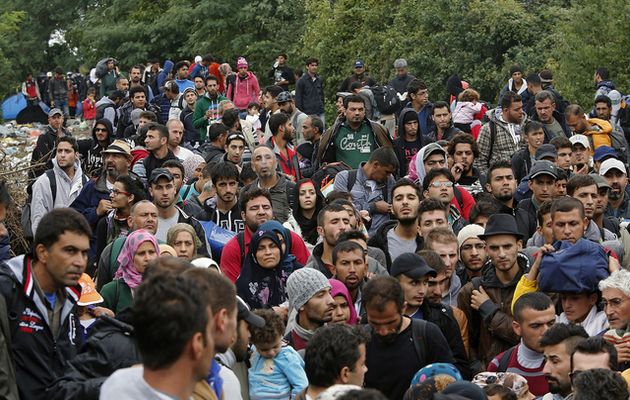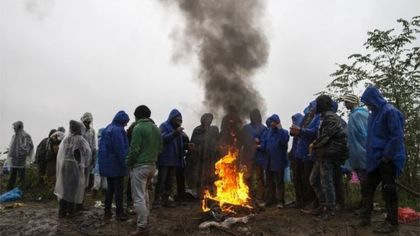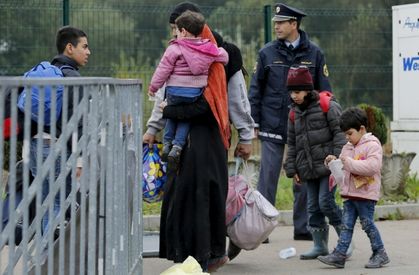Between 2,000 and 3,000 people who had been stranded in dangerous conditions for days, have been allowed to enter Croatia.
 Refugees cross the border / Reuters
Refugees cross the border / Reuters
Croatia has opened its border with Serbia, removing one of the bottlenecks for thousands of stranded migrants trying to make their way north.
About 3,000 people had been stuck in cold and wet weather in the Serbian border village of Berkasovo, after Croatia moved to curb new arrivals. The UN refugee agency (UNHCR) had described conditions there as "dire".
Many remain stranded near the Croatia-Slovenia border. The Balkan route has been squeezed by restrictions.
Hundreds of thousands of migrants, many from Syria, Africa and Afghanistan, have been making their way from Turkey to the Balkans in recent months, in a bid to reach Germany, Sweden and other EU states.
UNHCR spokeswoman Melita Sunjic, who is at the Berkasovo crossing, said late on Monday: "Without any announcement, the borders opened. Everybody rushed." Croatian buses are now taking the thousands of migrants who crossed the border to a nearby reception centre.
Croatia moved to limit the flow of migrants at the weekend, when Hungary closed its southern border and Slovenia announced its own restrictions, fuelling fears that migrants could get stuck in Croatia.
 UNHCR said 10,000 migrants were stranded in Serbia / Reuters
UNHCR said 10,000 migrants were stranded in Serbia / Reuters
BAD CONDITIONS AT THE BORDERS
In recent days, Croatia sent at least two trains and several busloads of migrants north towards the border with Slovenia. However Slovenian officials have accused the Croatian government of breaking an agreement to limit such transfers to 2,500 people a day, and have announced new restrictions on people coming in.
Slovenia’s interior minister, Vesna Gyorkos Znidar, said it was “absolutely unacceptable” that Croatia was sending large numbers of migrants toward the border when it had said it could only accommodate 2,500 a day.
The interior minister said that “the Croatian side is not responding” to the Slovenian demands to control the flow and is acting only as “a transporter”. Slovenia has also accused Austria of limiting the number of migrants it was accepting, although Austria denied the claim.
Croatia retorted that it did not have the legal authority to force migrants to stay in emergency shelters and accused Slovenia of taking in far fewer migrants than the country initially said it would take. He added that Croatia would not allow itself to become a “migrant collection centre.”
Meanwhile,the small border crossing at Trnovec became a picture of human misery, with hundreds stranded in no man's land in bone-numbingly cold rain. They had arrived in the early hours of Monday to find a line of police and barriers blocking their way into Slovenia.
 Aid workers on the ground described increasingly desperate conditions
Aid workers on the ground described increasingly desperate conditionsAid workers on the ground described increasingly desperate conditions, with little food and few blankets to protect thousands of people, including small children and families, from the elements.
MORE THAN 600,000 HAVE REACHED EUROPE
The International Migration Organization said on Monday that arrivals to Greece from Turkey were continuing at a rate of about 5,000 a day.
Before Monday's mass crossing, the UNHCR said 10,000 migrants were stranded in Serbia - with more than 6,000 entering from Macedonia on Monday alone.
Some Serbian officials have indicated they may in turn hold back arrivals from the south.
Germany's welcome for Syrian migrants continues to create internal tensions. Thousands of people took part in a rally organised by the Pegida organisation in Dresden on Monday evening to mark the first anniversary of the group, which campaigns against "Islamisation".
More than 600,000 people, most of them Syrians, have reached Europe so far this year compared with just over 200,000 for the whole of 2014
Germany has said it expects 800,000 asylum seekers this year, but it is believed the number could be as high as 1.5 million.

Las opiniones vertidas por nuestros colaboradores se realizan a nivel personal, pudiendo coincidir o no con la postura de la dirección de Protestante Digital.
Si quieres comentar o